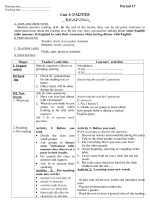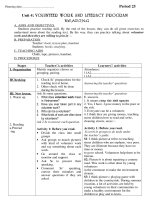- Trang chủ >>
- Văn Mẫu >>
- Văn Thuyết Minh
Bài soạn môn học Tiếng Anh 11 - Unit 13: Hobbies - Lesson: Speaking
Bạn đang xem bản rút gọn của tài liệu. Xem và tải ngay bản đầy đủ của tài liệu tại đây (1.98 MB, 8 trang )
<span class='text_page_counter'>(1)</span>LESSON PLAN 6 Unit 13: Hobbies Lesson: Speaking Class: 11/7 Time allotted: 45’ Aim: To help students learn and practice sub-skills of speaking. Objectives: By the end of the lesson, the students will be able to: - Talk about a hobby. - Talk about collections. - Use the vocabularies and ideas from speaking activities to improve writing skill. Teaching aids and materials: Textbook, blackboard, pictures, projector. Procedure: Stages/ time I. Warmup ( 5’). Activities Kim’s Game: Objective: to involve Ss in the lesson and lead in the topic of the speaking. - T divides class into 2 teams: A & B. - T gives the instructions: + T shows in turn 8 pictures about the activities on the screen. (Appendix) + Ss look at them, find their names and remember them in 30 seconds. + Each team’s representatives will go to the blackboard and write as many names as possible. + After 2 mins, which group has more correct names will be the winner. - T allows Ss to play game. - T checks Ss’ answers. - T declares the winner and gives gift. Expected names: Watching TV Swimming Playing computer games Reading books. Mountain climbing Stamp collecting Fishing Chatting with a friend on the phone. Lop11.com. Work arrangements Team work.
<span class='text_page_counter'>(2)</span> Lead in: + T asks Ss the questions: “What is the common topic of these activities?” Ss: HOBBIES + T introduces: “Today we are going to talk more about hobbies.” II. PreSpeaking ( 10’). 1. Pre-teach Vocabulary: Objective: to help Ss learn some new words before doing tasks. * Second-hand (a): Cũ - Eliciting technique: explanation - Eliciting question: “Goods bought after use by previous owner are called …” * Classify (v): Phân loại - Eliciting technique: translation - Eliciting question: How do you say “phân loại” in English? * Landscape (n): Thắng cảnh - Eliciting technique: example - Eliciting question: “Hue is a famous city with lots of beautiful ... such as Huong river, Ngu Binh mountain.” * Broaden (v): Mở mang, mở rộng - Eliciting technique: synonym - Eliciting question: What is another word for “widen”?. Teacher – whole class. 2. Checking: Jumbled word Objective: to help Ss remember the words that they’ve just learned. - T shows the jumbled words on the screen: * Ndesoc-andh * Ssiclayf * Sandlepca * Baorend - Ss are asked to reorder the letters to make the correct words. - T asks some Ss to write the words on the blackboard. - T checks the answers.. Teacher – whole class. Lop11.com.
<span class='text_page_counter'>(3)</span> III. While- 1. Activity 1: Speaking (Task 1 in textbook) (20’) Objective: to help Ss practice talking about hobby. - T shows the activities on the screen:. Say which of the following you would like/ not like to do and WHY. - T asks Ss to work in pairs. - Ss are asked to ask and answer about activities they would like/ not like to do and explain why. - T provides Ss with some useful language:. LIKES. DISLIKES. • like/ love/ enjoy/ fancy +V-ing • dislike +V-ing • be interested in +V-ing. • hate +V-ing. • be keen on +V-ing. • detest +V-ing. • be fond of +V-ing • prefer +V-ing TO + V-ing • would rather … THAN. • To be bored with + V-ing. Lop11.com. Pair work.
<span class='text_page_counter'>(4)</span> WHY? Because it makes me: - Relaxed - Boring - Interesting - Waste a lot of time - Happy - Tired - Sleepy - Funny - Have a lot of fun - Stronger - T gives Ss an example:. “I like swimming because it makes me stronger.”. “I don’t like playing computer games because it’s the waste of time .”. - T allows Ss to do the task. - T moves around to observe and help Ss. - T calls on some pairs to give the answers. - T listens and gives feedback. 2. Activity 2: (Task 2 in textbook) Objective: to help Ss familiar with the language used to talk about a collection. - T asks Ss to close their textbook. - T shows the dialogue with the missing phrases on the screen:. Lop11.com. Teacher – whole class.
<span class='text_page_counter'>(5)</span> Huong: What is your hobby, Lan? Lan: Well, I like (1) Huong: (2) how you to collect your books? Lan: Well, this must be done regularly. Whenever I find a book which is interesting I buy it immediately. Huong: (3) your books? Lan: I buy some from the bookshop near my house and some others from second-hand book stalls. Some times my friends, my mum and dad give me some. Huong: (4) your collection? Lan: I classify them into different categories and put each category in one corner of my bookshelf with a name tag on it. Huong: (5), Lan? Lan: I think I’ll continue to make my collection richer and richer. - T asks Ss to work individually and fill in the blank with the suitable phrases. - T invites some Ss to give the answers. Expected answer: (1): collecting books (2): could you tell me (3): where do you buy (4): how do you organize (5): what do you plan to do next - T invites a good S along with T role play the character Huong and Lan and read the dialogue as the model. - T calls some pairs to read the dialogue. - T listens and corrects Ss’ mistakes. 3. Activity 3: (Task 3 in textbook) Objective: to help Ss practice talking about a collection. - T asks Ss to work in pairs. - In each pair, Ss are asked to make a similar dialogue about collecting stamps. - T shows the suggestions on the screen:. Lop11.com. Pair work.
<span class='text_page_counter'>(6)</span> Buy from post office, travel agency. Ask members of family, friends … Make pen friends with people overseas. Broaden your knowledge about landscape, people, animals …. Why to collect. How to. collect. Exchange stamps with others. Stamps How to organize. Classify stamps into categories: animals, plants, …. Plan for the future Where to keep Collect more stamps. In album. Display on a gallery. - T lets Ss do the task. - T goes around observing and helping Ss. - T calls on some pairs to present their dialogues in front of the class. - T listens and notes down Ss’ mistakes. - T gives corrections for some major mistakes. Expected dialogue: Huong: What is your hobby, Lan? Lan: Well, I like collecting stamps. Huong: Could you tell me how to collect your stamps? Lan: Well, I ask the member of my family, my friends, my relatives and the postmen to give me discarded envelopes. In addition, I make friends with people overseas and exchange stamps with others. I also buy them. Huong: Where do you buy your stamps? Lan: I buy them from the post office. Huong: How do you organize your stamps? Lan: Well, I classify them into categories: animals, plants, birds, landscape, people (heroes, politicians, football players, singers etc.) Huong: Where do you keep your stamps? Lan: In album. Huong: Why do you collect stamps?. Lop11.com.
<span class='text_page_counter'>(7)</span> IV. PostSpeaking (9’). Lan: I want to broaden my knowledge and know more about landscape, people, animals, plants and trees. Huong: What do you plan to do next, Lan? Lan: I think I will continue to collect more stamps to enrich my collection. Reporting: Objective: to help Ss use the vocabularies and ideas in previous tasks to improve writing skill. - T asks Ss to work in groups of 4. - In each group, Ss are asked to write a report on the hobbies of 4 members in their group. - T gives Ss some hints: + What/ hobby? + When/ start your hobby? + How often/ ? + Why/ ? + How/ feel about this hobby? + What/ plan for the future? You can begin your report with: Each member in our group has different hobbies. Two out of four spend much time reading books every day … - T moves around class to monitor and help Ss if necessary. - T calls on some Ss to read out their report. - T listens and gives feedback. Homework (1’) - T asks Ss to learn the new words. - T reminds Ss to prepare the next lesson (Listening, p.150).. Instructor:. Trainee teacher:. Lop11.com. Group work.
<span class='text_page_counter'>(8)</span> APPENDIX. Lop11.com.
<span class='text_page_counter'>(9)</span>









